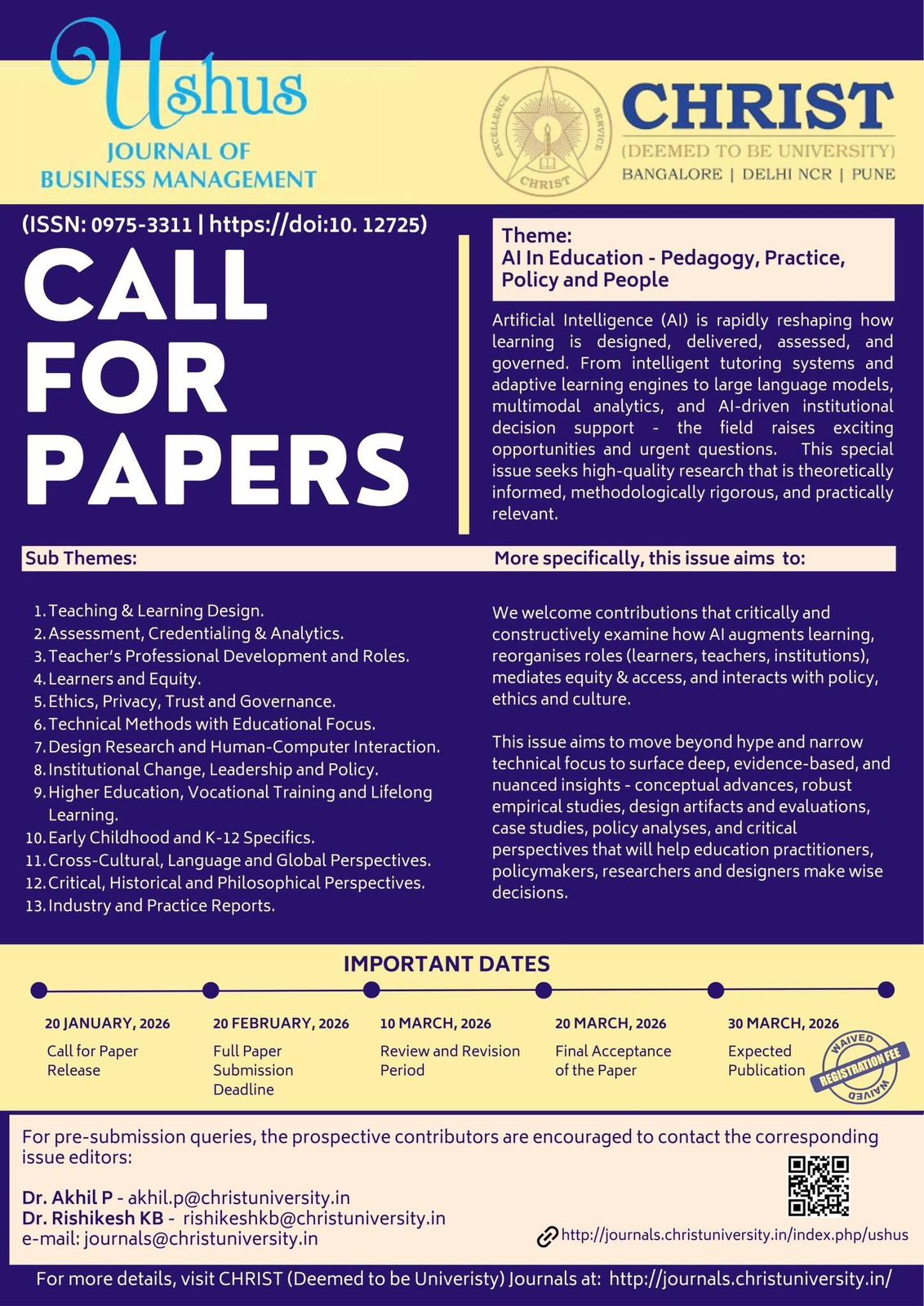Work Values, Organisational Commitment and Job Satisfaction in Relation to Employee Career Stages in Information Technology Organisations
DOI:
https://doi.org/10.12725/ujbm.47.5Keywords:
Career Stages, Job Satisfaction, Organisational CommitmentAbstract
The booming Information Technology sector in India has changed the employee-employer relationship. This article investigates the relationship between career stages and work values, organisational commitment and job satisfaction of employees to gain new insights. 190 employees at various career stages were administered three standardised reliable and valid questionnaires on work values, organisational commitment and job satisfaction. A significant difference in cognitive, affective, and instrumental values was seen across career stages. In addition, career stages were found to have no impact on organisational commitment and job satisfaction.
References
Allen, N.J, & Meyer, J.P. (1999). Organizational commitment: Evidence of career stage effect. Journal of Business Research, 26, 49-61.
Beyerlein, M. Johnson, D., & Beyerlein. (1999). Advances in multidisciplinary studies of work teams Greenwich. Conn : JAI Press.
Bilz, J. (2008). Teacher career stages and job satisfaction. Unpublished dissertation, Walden University.
Cennamo, L., & Gardner, D. (2008). Generational differences in work values, outcomes and person-organization values fit. Journal of Managerial Psychology, 23, 891-906.
Collins, J. 1988. Why we must keep Baby Boomers working. New Zealand Business, 12(8), 53.
Cron, W. L., & Slocum, J. W. Jr. (1986). The influence of career stages on salespeople‟s job attitudes, work perceptions and performance. Journal of Marketing Research, 23, 119-129.
Deal, J.J (2007). Retiring the generation gap: how employees young and old can find common ground. San Francisco CA: Jossey Bass.
Drucker, P. (1992). Managing For the Future New York: Harper Collins.
Elizur, D. (1984). Facets of work values: A structural analysis of work outcomes. Journal of Applied Psychology, 69(3), 379-89.
Flaherty, K.E., & Pappas, J.M. (2003). Using career stage theory to predict turnover intentions among sales people. Journal of Marketing Theory and Practice, 10, 48-57.
Hansen, J.C., & Leuty, M .E. (2012). Work values across generations. Journal of Career Assessment, 20(1), 34-52.
Hui-Chun, Y., & Miller, P. Leadership style: The X Generation and Baby Boomers compared in different cultural contexts. Leadership & Organization Development Journal, 26(1), 35–50.
Jurkiewicz, C.E. (2000). Generation X and the public employee. Public Personnel Management, 29, 55-74.
Karp, H., Fuller, C., & Sirias, D. (2001). Bridging the Boomer gap: creating authentic teams for high performance at work. Black Publishing, Palo Alto, CA.
Lancaster, L.C., & Stillman, D. (2002). When generations collide: Traditionalists, Baby Boomers, Generation Xers, Millennials: who they are, why they clash, how to solve the generational puzzle at work. New York: Harper Collins.
Levinson, D.J. (1986). A conception of adult development. American Psychologist, 41, 3-13.
Levinson, D. J., Darrow, C. N., Klein, E. B., Levinson, M. H., & McKee, B. (1978). The seasons of a man's life. New York:
Loughlin, C., & Barling, J. (2001). Young workers‟ values, attitudes, and behaviours. Journal of Occupational and Organizational Psychology, 74(4), 543-58.
Lyons, S. (2004). An exploration of generational values in life and at work. Dissertation Abstracts International, 3462A (UMI No. AATNQ94206).
Lyons, S. Duxbury, L., & Higgins, C. (2005). An empirical assessment of generational differences in work related values. Human Resource Management, 26, 62-71. McArdle, S., Waters, L., Briscoe, J., & Hall, D. (2007). Employability during unemployment: Adaptability, career identity and human and social identity. Journal of Vocational Behavior, 7, 247-26. Mowday, R.T., Steers, R.M., & Porter, L.W. (1979). The measurement of organizational commitment. Journal of Vocational Behavior, 14(2), 224-47. NASSCOM. (2011). NASSCOM HR Survey Report. Ornstein, S., Cron. W. L., & Slocum, J. W. Jr. (1989). Life stage vrs. career stage : a comparative test of theories of Levinson and Super. Journal of Organizational Behavior, 10, 117-133. Parker, B., & Cusmir, L.H. (1999). A generational and sex based view of managerial work values. Psychological Reports, 66, 947-951. Putti, J. M., Aryee , S., & Liang, T. K. (1989). Work values and organizational commitment: A study in the Asian context. Human Relations, 42, 275-88. Real, K., Mitnick, A.D., & Maloney, W. F. (2010). More similar than different: Millennials in the US building trades. Journal of Business Psychology, 25, 303-313.
Rhodes, S. (1983). Age-related differences in work attitudes and behaviour: a review and conceptual analysis. Psychological Bulletin 93, 328-367.
Riordan, C.M., Griffith, R.W., & Weatherly, E.W. (2003). Age and work-related outcomes: the moderating effects of status characteristics. Journal of Applied Social Psychology, 33(1), 37-57.
Rokeach, M. (1973).The nature of human values. New York: Free Press.
Slocum, J., & Cron, W. (1985). Job attitudes and performance during three career stages. Journal of Vocational Behavior, 26, 126-145. Smola, K.W., & Sutton, C.D. (2002). Generational differences: Revisiting generational work values for the new millennium. Journal of Organisational Behaviour, 23, 363-82. Super, D. E. (1957). The Psychology of careers. New York: Harper. Super, D. E. (1984). Career and life development. In D. Brown & L. Brooks (Eds), Career choice and development. Jossey-Bass, San Francisco.
Super, D. E., Selkowits, R. S. & Thompson, A. S. (1981). Career development inventory: Adult Form I, Teachers' College. Columbia University, New York. Twenge, J. M., Campbell, S.M., Hoffman, B.J. & Lance, C.E. (2010). Generational differences in work values: Leisure and extrinsic values increasing, social and intrinsic values decreasing. Journal of Management, 36(5), 1117-1142.
Twenge, J. M. (2007). Generation me: why today’s young Americans are more confident, assertive, entitled — and more miserable than ever before. Free Press.
Wiant, C.J. (1999). Are you listening to your employees? Journal of Environmental Health, 62, 51-52.
Warr, P.B., Cook, J.D., & Wall,T.D. (1979). Scales for the measurement of work attitudes and aspects of psychological wellbeing. Journal of Occupational Psychology, 58(2), 129-48.
Semke, R., Raines, C., & Filipcsak, B. 2000. Generations at work: managing the clash of veterans, boomers, xers and nesters in your workplace. New York: AMACOM.
Downloads
Published
How to Cite
Issue
Section
License
Copyright (c) 2019 Arti Arun Kumar

This work is licensed under a Creative Commons Attribution-NonCommercial-NoDerivatives 4.0 International License.



